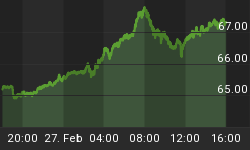With the downturn in the precious metals markets making even the most stalwart investors question their instincts; it's good to have some advice from the field about what is really going on out there. Here today David Galland, of Casey Research (publishers of Casey's International Speculator) offers some insights into the current state of the precious metal... and what to look for in the companies that mine it.
I have just returned from my bi-monthly pilgrimage to Vancouver, known by many as the Mecca of Mining - or at least to the junior mining exploration sector - to check in on our research team there and to reacquaint myself with the buzz in this hotbed of hot stocks.
If I were pushed to name one impression over all others gained during my trip, it would be the general state of gloom hanging over the place. Were I a writer of the genre of Cormac McCarthy, I might try to describe the mood thus...
"He arrived to a dark sky and laid down on the cold cement and felt the wet of it soak through the back of his suit. He wanted to call a cab but wanted more to sleep here and now."
This, of course, is a far cry from the Vancouver vibe in frothy times, when the deal flow is humming and the investors are biting at every new stock like trout at live bait. In those happier days, the community of junior mining "professionals," a term I use loosely, are a positively effervescent lot. With their fine Italian leather shoes, shiny suits and attentively coiffed hairdos, they positively bubble over with the money they are making by selling large handfuls of the freshly printed paper that is mostly the stock of their trade.
But with a damp fog enveloping the sector since last August, the streets of the town are quiet, the conversations subdued. One sure sign of how dire the outlook is, is that I was asked four or five times, "So, what do you think about technology plays?"
(For those of you new to the Vancouver market, it may be helpful to think about it like one of those multi-colored, multi-cartridge pens most often found in close proximity to members of the local high school chess club. When red is the color of the day, then red it is. But when that falls from favor, a quick click and you are writing in green or perhaps turquoise. In the Vancouver market, when mining is out of favor, the promoters go "click" and just like that, their unwanted mining shells become technology plays.)
While I don't sense that things have gotten quite that bad, there is no question that they are bad. But bad is a relative term, because it is in a market like this that the smartest speculators plant the seeds of fortune.
On that topic, a couple of further observations...
-
It's a buyers market. My many conversations over the past two days have been punctuated by tales of well-known promoter types being unable to close financings, even small ones. Translation: if you are going to invest at this point, be selective, try wherever possible to get into private placements where you can get a share and a warrant... and be firm on the terms you will require in exchange for your money. The mining promoters need you a lot more than you need them.
On a practical level, when a mining promoter tells you that you better hurry up and get your money in because a deal is going to close, be skeptical. If you like the management, and you like the project, tell him that you are only investing in deals with a two-year warrant on good terms.
-
Stick with quality. Make sure your portfolio is made up only of quality companies that are well cashed up and able to deliver on their aspirations. A number of "wannabe" companies are running out of cash and will either have trouble finding that cash or be forced to offer terms that will be significantly dilutive to existing shareholders.
-
Watch the cost side of the equation. On companies that are in the feasibility phase, look hard at the potential for bad news on the capital expenditure front. Few things will send a stock down harder than the revelation that the mine they had expected to bring in for $400 million will now cost upwards of $1 billion.
As for the opportunity, the Wall of Worry about the sector now looms so high, it is almost as if we have been pushed back to the "Stealth" phase, the phase where no one wants to hear about the Canadian junior exploration stocks. That spells opportunity, because when there are only sellers and few buyers, the only direction a stock can go is up... once the dust settles. But only for the quality companies; the paper tigers are doomed.
The bottom line: Keeping your eyes firmly fixed on the prize and today's soft markets means you can get positioned into great companies at deep discounts from where they should be trading. And certainly will be trading, when the broader market understands that the commodities bull market is very much intact and that if you want to buy into the sector, you invariably will have to do it on a Canadian exchange.
David Galland is managing director of Casey Research, publishers of Doug Casey's International Speculator, now in it's 28th year. New subscribers are invited to try a subscription for three full months with the security of a 100% money-back satisfaction guarantee. Learn more and sign up now.















